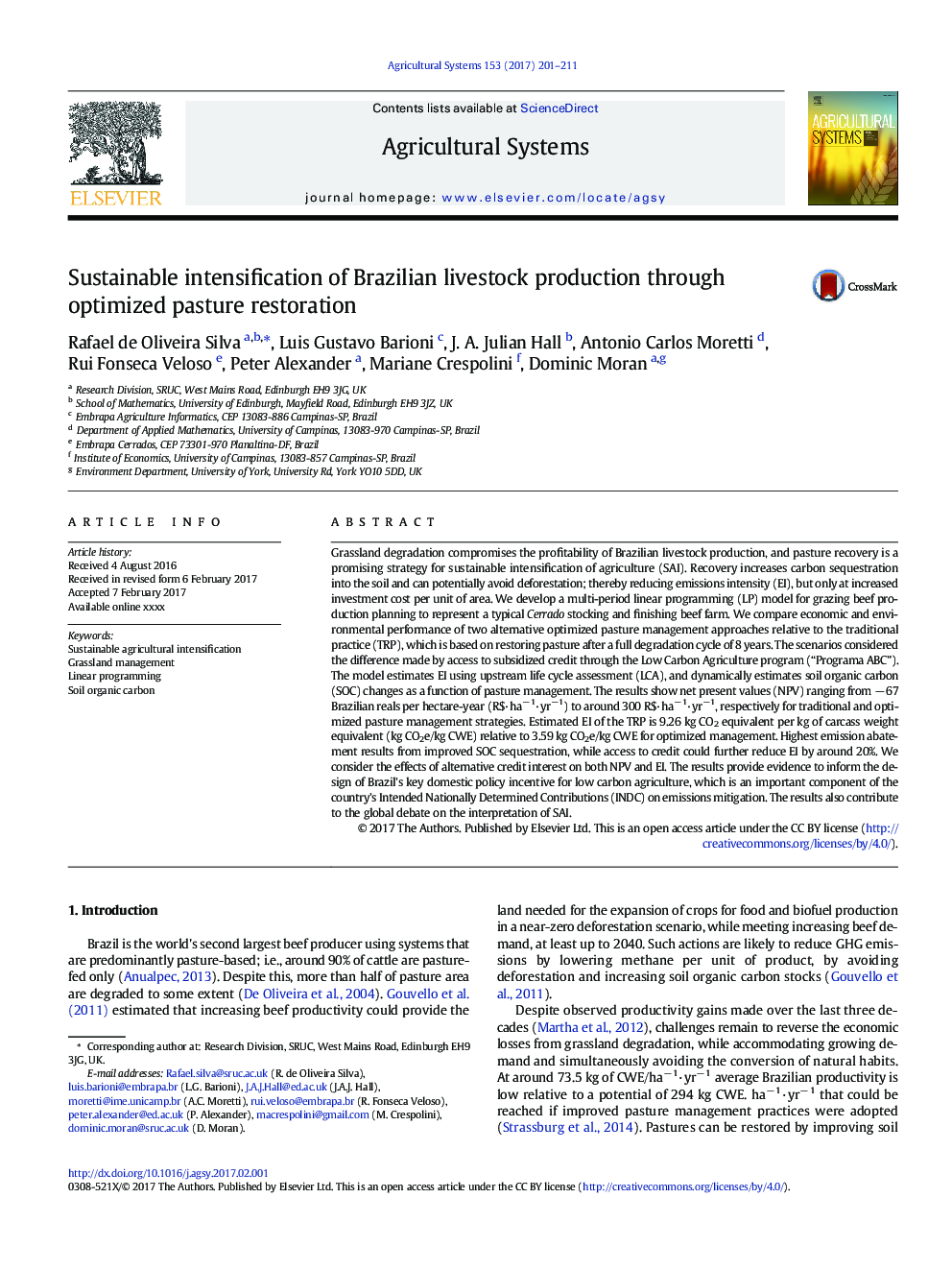| کد مقاله | کد نشریه | سال انتشار | مقاله انگلیسی | نسخه تمام متن |
|---|---|---|---|---|
| 5759757 | 1623217 | 2017 | 11 صفحه PDF | دانلود رایگان |
عنوان انگلیسی مقاله ISI
Sustainable intensification of Brazilian livestock production through optimized pasture restoration
ترجمه فارسی عنوان
تشدید پایدار تولید حیوانات برزیلی از طریق ترمیم مناسبی بهینه شده
دانلود مقاله + سفارش ترجمه
دانلود مقاله ISI انگلیسی
رایگان برای ایرانیان
کلمات کلیدی
تشدید کشاورزی پایدار، مدیریت چمن، برنامه ریزی خطی، کربن آلاینده خاک
موضوعات مرتبط
علوم زیستی و بیوفناوری
علوم کشاورزی و بیولوژیک
علوم کشاورزی و بیولوژیک (عمومی)
چکیده انگلیسی
Grassland degradation compromises the profitability of Brazilian livestock production, and pasture recovery is a promising strategy for sustainable intensification of agriculture (SAI). Recovery increases carbon sequestration into the soil and can potentially avoid deforestation; thereby reducing emissions intensity (EI), but only at increased investment cost per unit of area. We develop a multi-period linear programming (LP) model for grazing beef production planning to represent a typical Cerrado stocking and finishing beef farm. We compare economic and environmental performance of two alternative optimized pasture management approaches relative to the traditional practice (TRP), which is based on restoring pasture after a full degradation cycle of 8 years. The scenarios considered the difference made by access to subsidized credit through the Low Carbon Agriculture program (“Programa ABC”). The model estimates EI using upstream life cycle assessment (LCA), and dynamically estimates soil organic carbon (SOC) changes as a function of pasture management. The results show net present values (NPV) ranging from â 67 Brazilian reals per hectare-year (R$·haâ 1·yrâ 1) to around 300 R$·haâ 1·yrâ 1, respectively for traditional and optimized pasture management strategies. Estimated EI of the TRP is 9.26 kg CO2 equivalent per kg of carcass weight equivalent (kg CO2e/kg CWE) relative to 3.59 kg CO2e/kg CWE for optimized management. Highest emission abatement results from improved SOC sequestration, while access to credit could further reduce EI by around 20%. We consider the effects of alternative credit interest on both NPV and EI. The results provide evidence to inform the design of Brazil's key domestic policy incentive for low carbon agriculture, which is an important component of the country's Intended Nationally Determined Contributions (INDC) on emissions mitigation. The results also contribute to the global debate on the interpretation of SAI.
ناشر
Database: Elsevier - ScienceDirect (ساینس دایرکت)
Journal: Agricultural Systems - Volume 153, May 2017, Pages 201-211
Journal: Agricultural Systems - Volume 153, May 2017, Pages 201-211
نویسندگان
Rafael de Oliveira Silva, Luis Gustavo Barioni, J. A. Julian Hall, Antonio Carlos Moretti, Rui Fonseca Veloso, Peter Alexander, Mariane Crespolini, Dominic Moran,
